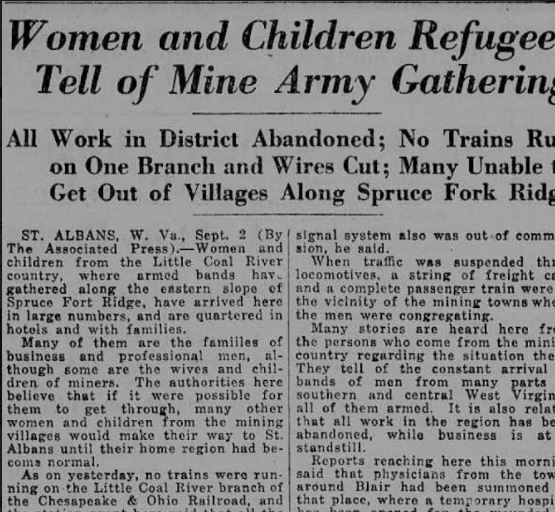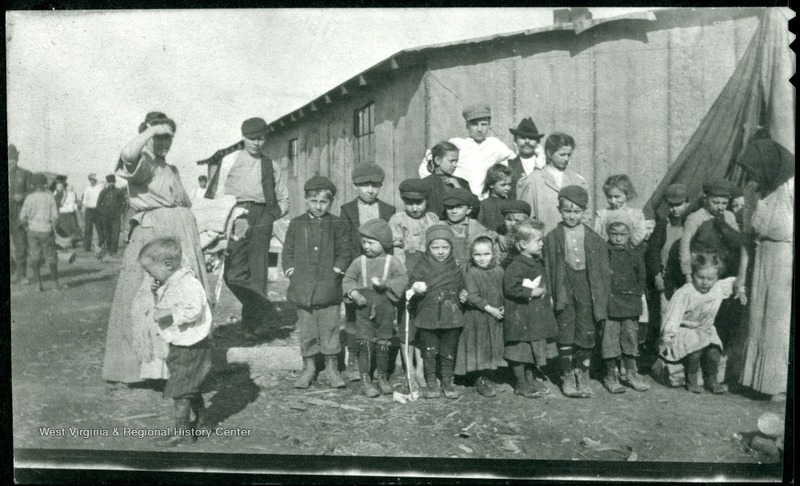Women at Home
The Mine Wars laid waste to the coal camp communities, and some families had no choice but to flee, especially when they were abandoned by their spouses. Over the course of the mine wars, hundreds of men were killed (Hood, 2020), and their families left with no one to provide for them.
In this artifact published by The Washington Times, families who were displaced by the violence in the coal camps fled to St. Albans. As the article reveals, navigating the routes made dangerous by armed fighters was made even more difficult by the suspension of transportation. Essentially, the entire Southern West Virginia landscape was ravaged by war, and those who weren’t involved in the fighting became refugees.
The mass displacement of miners and their families resulted in a refugee and homelessness crisis. “Striking miners and families were evicted from their company-owned homes and forced to live in tent colonies set up by the union” (Public Broadcasting Service, 2021). The tent colonies sprang up on the private land of allies, as the striking miners would have been forced off federal property (Public Broadcasting Service, 2021). There, women became the backbone of their survival; the tent colonies consisted of mostly women and children (Hylton, 2020). While families tried to make the best of the situation, the elements made living in the tent colonies brutal. One woman reported going to live with other distant family members during the cold winter months so that she could safely birth her child (Hylton, 2020). Throughout this conflict, women and families endured unimaginable hardships for their families, and their contributions were just as salient as their male counterparts.
During the battle of Blair Mountain, miners, and frequently their families, lived in "tent colonies". The coal companies owned so much of the miners' lives, including their housing, that they were displaced at a moment's notice- often violently. Although life in the coal camps was normally very survivalist, life in the tent colonies was even more so this way (Gourley, 2019). While the men fought, women had to take up gardening and animal husbandry to support the community. Many common notions of domesticity disappeared during these times. Women built very strong community with the other wives and children in the tent colonies, all commonly tied together by the fear of losing their husbands and sons in the fight for freedom (Public Broadcasting Service, 2021).
The roles of the women who lived in the tent colonies were extremely vital. As cliché as it sounds, the women very much the behind-the-scenes of the strikes. At any point, a miner and his family could choose to withdraw from the fight and return to life in the camps (Boissoneault, 2017). This would mean living in a house, with relatively stable employment, as well as other conveniences afforded by living in the camp and returning to work in the mines. At times, this would have seemed far more desirable than living in the tent colonies. The choice to stay and fight was just as real for those who took care of the home as it was for those who were on the front lines.
The linked recordings are from an interview conducted in 1972. Lana Harlow, the interviewee, was a child during the Battle of Blair Mountain. In the tapes, she recounts much of what life was like from her perspective during that time, and also shares some stories of other people who she knew at the time. For example, Lana talks about the way that food was cooked in huge pots in the tent colonies, and also describes the experience of her brother-in-law who was charged for treason afterwards and put in prison. Because Lana experienced the mine wars as a child, her experiences offer a different perspective than what may be found in textbooks or historical records.
Lana also talks about her mother-in-law being evicted from their company-owned home, a practice all too common during the time before the unions. As women were the main group of people at home all day while the men worked in the mines, they were very frequently the ones who faced threats by the mine guards, and were informed of the burdensome news that they would be evicted. These were weights that the women uniquely had to carry for their families. (Public Broadcasting Service, 2021). Lana also recalls the mine guards breaking into homes at night and confiscating the miners' weapons when they got wind of unionizing. The fear and intimidation used by the coal companies affected the entire family unit, not only the miners who worked.


